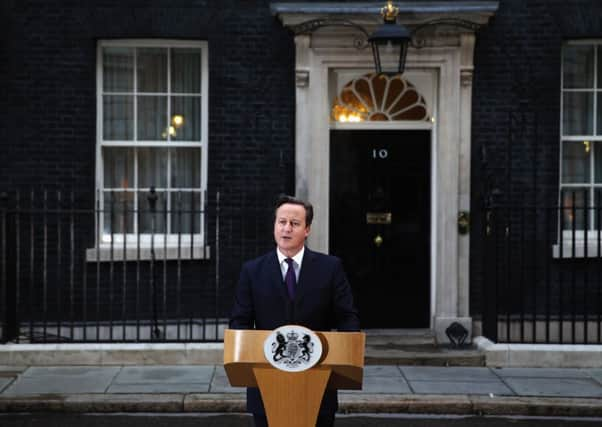Ian Swanson: Scotland’s future not settled


David Cameron was in town to mark the occasion and insist the UK party leaders had fulfilled the promises they made in the famous “Vow”.
They had said an outline plan would be ready by the end of October and it was; they had promised cross-party agreement by St Andrew’s Day and there was; and they said draft legislation would be published by Burns Night – and here it was three days early.
Advertisement
Hide AdAdvertisement
Hide Ad“Be in no doubt, whoever forms the UK government after May 7, these new powers are guaranteed,” he declared. So is it really job done?
Leave aside the debate over whether the new powers – the package recommended by the cross-party Smith Commission – go far enough. Can people be confident that what it came up with will be delivered?
The SNP may have been too quick to cry betrayal in the wake of the referendum. Whatever was said during the campaign, no-one could realistically expect a shiny new devo-max constitution to appear overnight.
But the UK parties may equally be claiming too much when they boast about what they have achieved.
Advertisement
Hide AdAdvertisement
Hide AdThe trouble is this is the run-up to a general election which appears to be on a knife edge. Every word and deed of all politicians of every colour has to be judged in that light – and Scotland’s future is no exception.
Mr Cameron notoriously used his speech in Downing Street the morning after the referendum to say more powers for Scotland would have to proceed “in tandem” with devolution for other parts of the UK. The Tories are now more interested in “English votes for English laws” than handing the Scottish Parliament extra powers. So their mainfesto is likely to focus more on restricting the voting rights of Scottish MPs at Westminster than extending the responsibilities of MSPs at Holyrood.
The Liberal Democrats will argue the case for federalism, but if they have the chance of being part of a coalition after the election, there is no saying what position they might take.
Labour will stress its role as the party that delivered devolution in the first place, but it has changed its stance on the more powers issue several times already.
Advertisement
Hide AdAdvertisement
Hide AdOne academic who has monitored the post-referendum manoeuvrings predicts that what actually happens after the general election will bear little resemblance to the draft clauses published today.
Having met the targets they set themselves for producing proposals, the pressure is now off the political parties.
“Their immediate priority has been to be able to say ‘We said we would do this and this and we have done’. After the election there will be no such pressure,” says the academic.
“Their motivation is now going to be driven by their own political needs.
Advertisement
Hide AdAdvertisement
Hide Ad“There will be more powers for the Scottish Parliament, but how far they go will be determined by political necessity.
“No-one’s saying it will be a completely different programme, but their definition of what ‘implementation’ means may vary.”
None of this should come as much of a surprise. Political reality almost inevitably trumps high-minded words, but it means Scotland’s future is still far from settled.